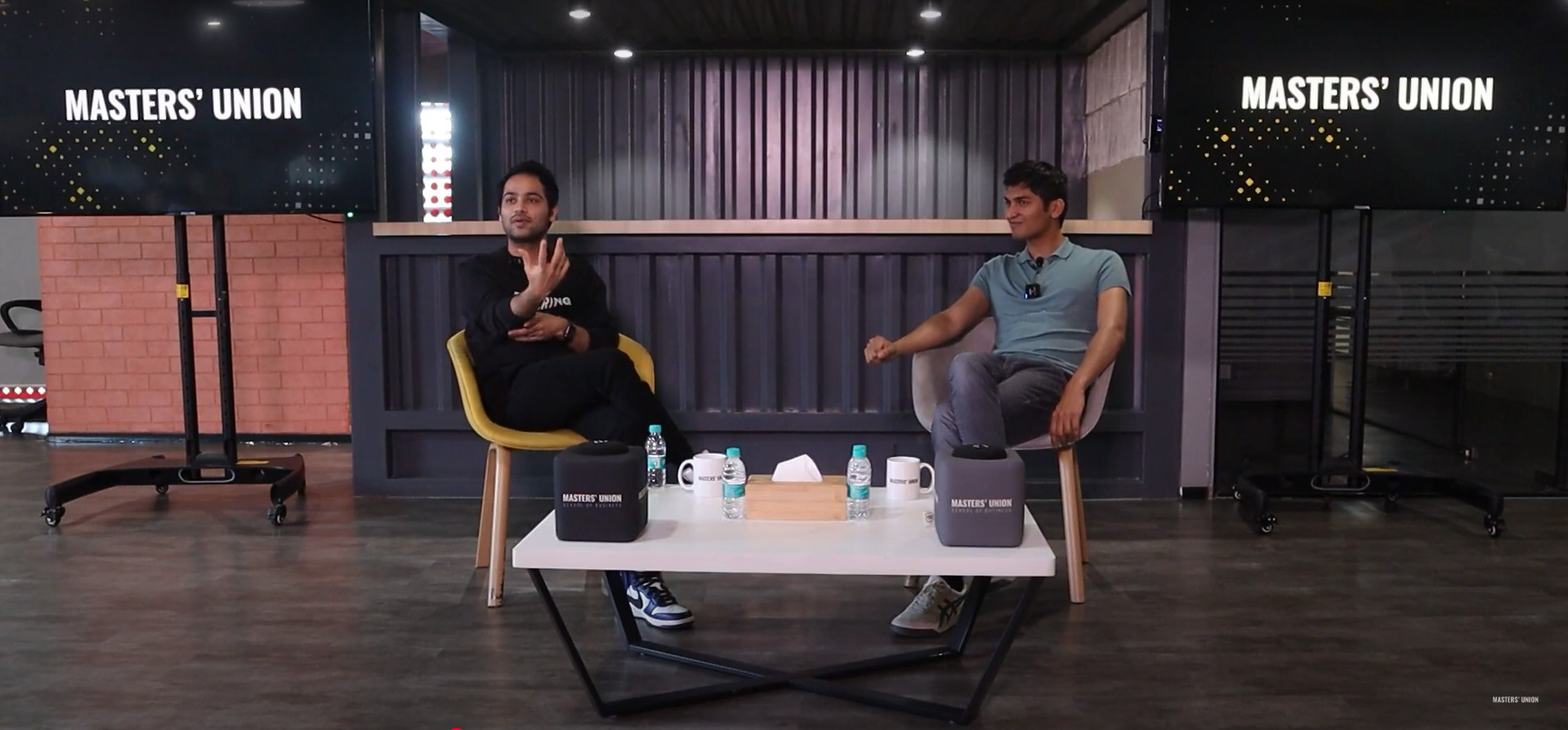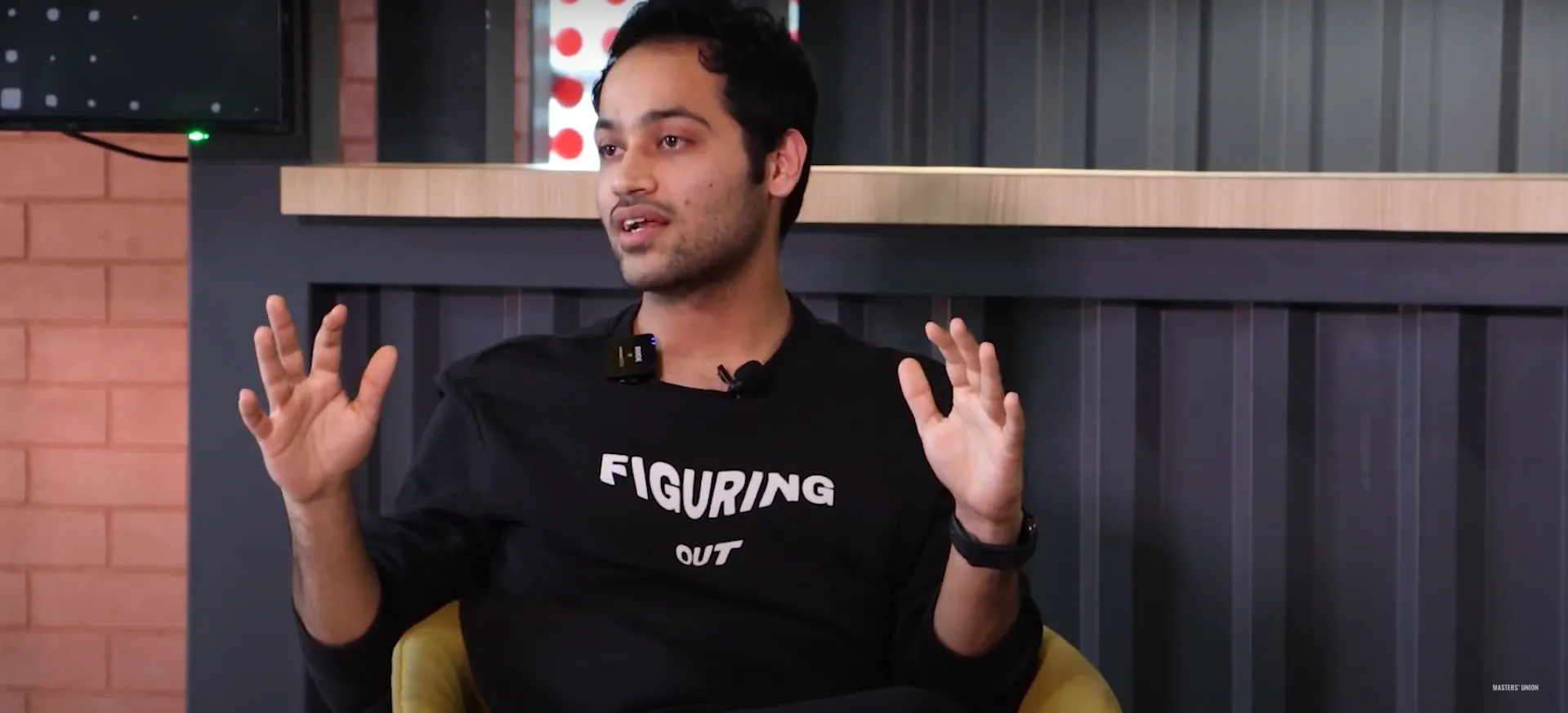School of Business
School of Emerging Technologies
Executive Programme
Innovations
Student Life
Business
Embracing the Creator Economy: Lessons from Raj Shamani at Masters’ Union
January 28, 2025

Entrepreneurship, content creation, and personal branding — once distinct fields — are now blending into one, and we are seeing a global trend of rising “creatorpreneurs”.
Raj Shamani, a leading voice in this space, captivated Masters’ Union students and unpacked the creator economy, the power of personal branding, and the goldmine within niche markets.
Want to watch the video instead?
Raj Shamani’s full discussion at Masters’ Union is now available as part of our Series C session recordings. Watch the video to gain deeper insights into his entrepreneurial journey, branding strategies, and expert advice on thriving in the creator economy.
The evolution of the creator economy
Shamani asserts that the future will see individuals operating in one of two capacities—either as creators or as investors. With the rise of digital platforms democratising access to audiences, anyone can establish themselves as a brand, provided they understand the dynamics of content creation and digital engagement. This shift highlights the necessity of building a personal brand, not just as a differentiator but as an asset that drives opportunities in business and beyond.
Traditionally, business success relied heavily on institutional affiliations and corporate credentials. However, in today’s decentralised ecosystem, influence and reach have become the new currency. Whether launching a startup, scaling a business, or seeking career advancement, the ability to cultivate an engaged audience can provide significant leverage.
Personal branding: The new competitive advantage
Shamani emphasises that personal branding is no longer a luxury but a necessity. Establishing credibility, attracting investment, and unlocking career opportunities are all contingent on how effectively one positions themselves in the digital space.
His own journey serves as a testament to this principle. By consistently creating high-value content and engaging with his audience, Shamani not only built a formidable online presence but also leveraged it to drive business ventures. He underscores that personal branding is not about vanity metrics but about fostering trust and delivering value. For business students, this translates into strategically curating content that showcases expertise, thought leadership, and problem-solving capabilities.
The shift to discovery-based buying
One of the most significant transformations in consumer behaviour, according to Shamani, is the shift from intent-based to discovery-based buying. Traditional marketing focused on fulfilling explicit consumer needs—driven by search-based intent. However, the proliferation of social media has reversed this dynamic. Today, consumers are increasingly discovering products through creators rather than actively searching for them.
This evolution presents an unprecedented opportunity for brands and businesses to integrate with content creators as a primary distribution channel. By understanding audience psychology and curating compelling narratives, businesses can capitalise on this trend to enhance their reach and conversion potential.
Strategic content creation and platform-specific approaches
Shamani underscores the importance of platform-specific content strategies. Each social media platform operates with distinct algorithms, user behaviours, and engagement models. A one-size-fits-all approach is ineffective in today’s competitive digital landscape.
For instance, short-form video content on platforms such as Instagram Reels and YouTube Shorts caters to rapid consumption, while long-form content on YouTube and LinkedIn allows for deeper engagement and thought leadership. Understanding these nuances and aligning content strategies accordingly can significantly impact a creator’s visibility and influence.
The power of data-driven decision making
One of the key takeaways from Shamani’s discussion was the necessity of leveraging data analytics in content creation. Metrics such as audience engagement, watch time, and demographic insights provide crucial feedback that can refine content strategies. Creators and entrepreneurs who harness these data points can optimise their content to resonate better with their target audience, ultimately driving higher engagement and monetisation opportunities.
Shamani advises aspiring creators and business leaders to treat content creation as an iterative process—experimenting, analysing performance metrics, and adjusting strategies accordingly.
Monetisation: Turning influence into income
For those looking to translate digital influence into financial success, Shamani highlights several monetisation pathways. These include brand partnerships, affiliate marketing, digital products, subscription models, and community-based revenue streams. However, he stresses that the most sustainable approach is building an authentic and engaged audience first—monetisation will naturally follow.
Niche selection plays a critical role in this equation. Creators who carve out a specialised focus tend to build more loyal followings, resulting in higher-value partnerships and revenue potential. For instance, creators in finance, technology, and business education often command premium brand deals due to the high purchasing power of their audience.
The role of regional content and language diversity
A particularly interesting insight from Shamani’s session was the untapped potential of regional content. While English-language content dominates global platforms, a significant portion of internet users prefer consuming content in their native language. By addressing this market, creators can unlock exponential growth opportunities and engage diverse audiences in a more meaningful manner.
Conclusion: The future belongs to digital entrepreneurs
Raj Shamani’s session at Masters’ Union reinforced a fundamental shift in the business landscape—where digital influence, personal branding, and content creation are no longer optional but essential. Business students must embrace these paradigms to stay ahead of the curve.
Whether one aspires to be an entrepreneur, a corporate leader, or an investor, the ability to navigate and leverage the creator economy will be a decisive factor in future success. By integrating the insights shared by Shamani, students can position themselves as thought leaders in their respective fields and harness the vast opportunities of the digital age.


